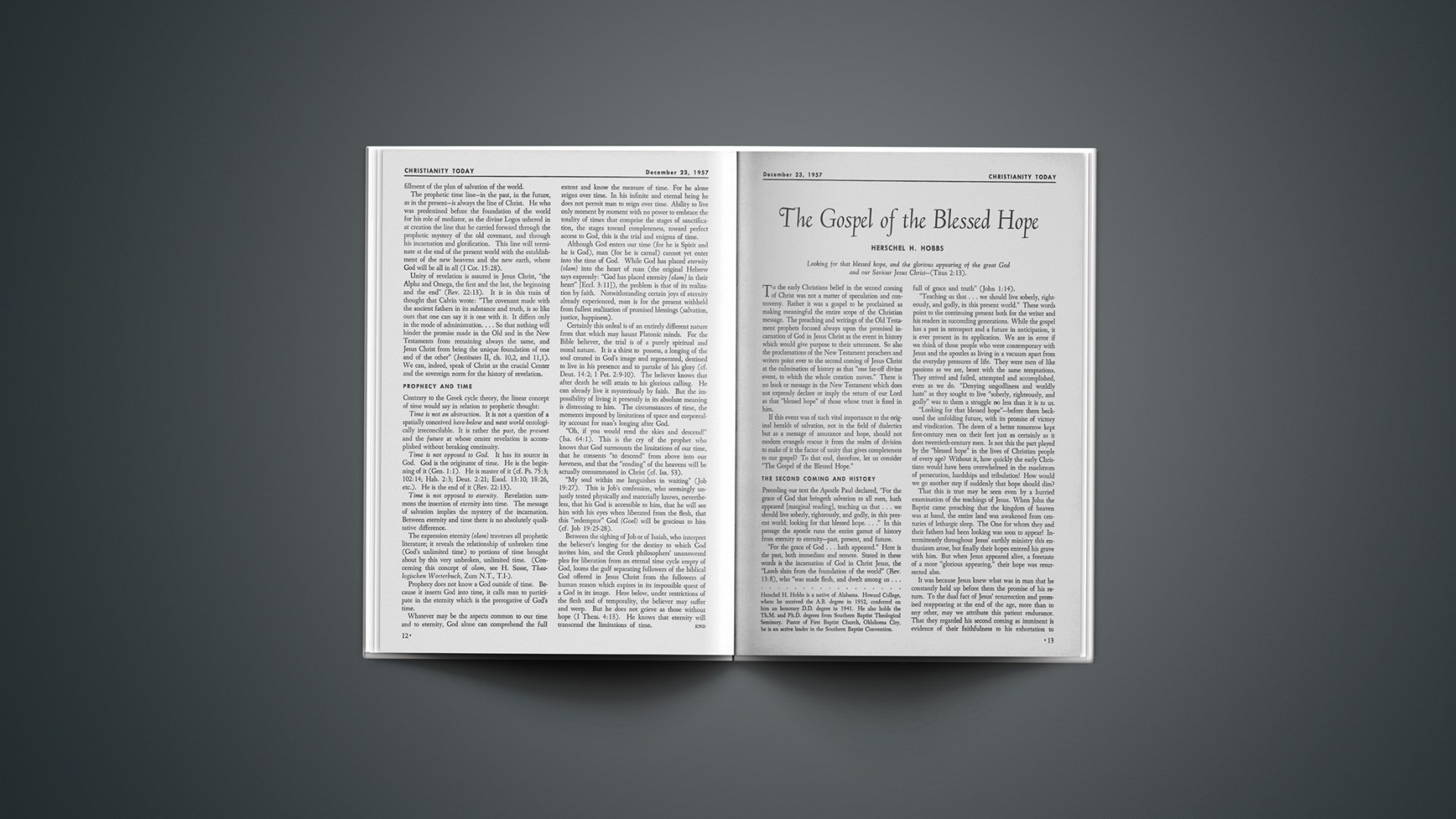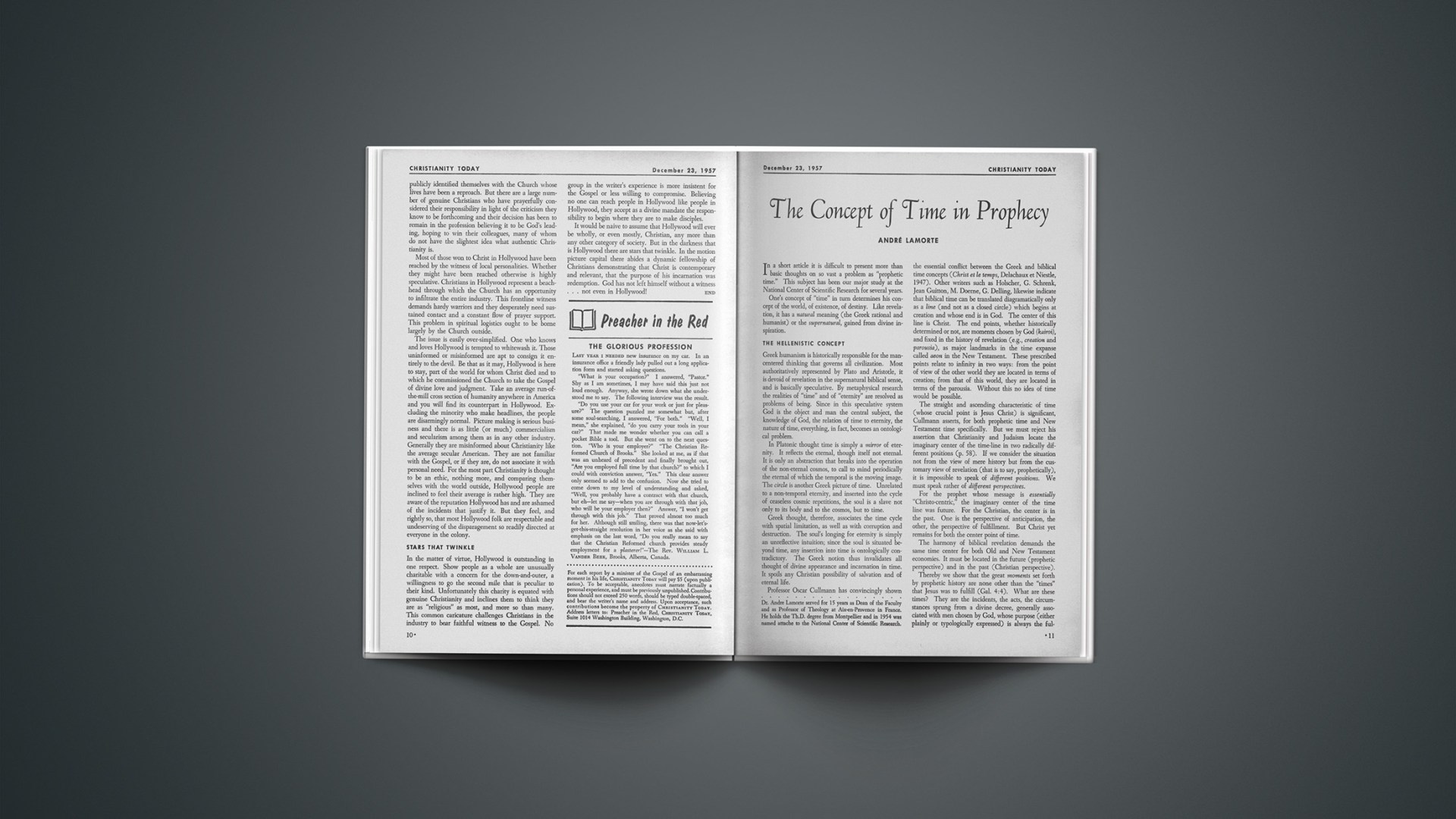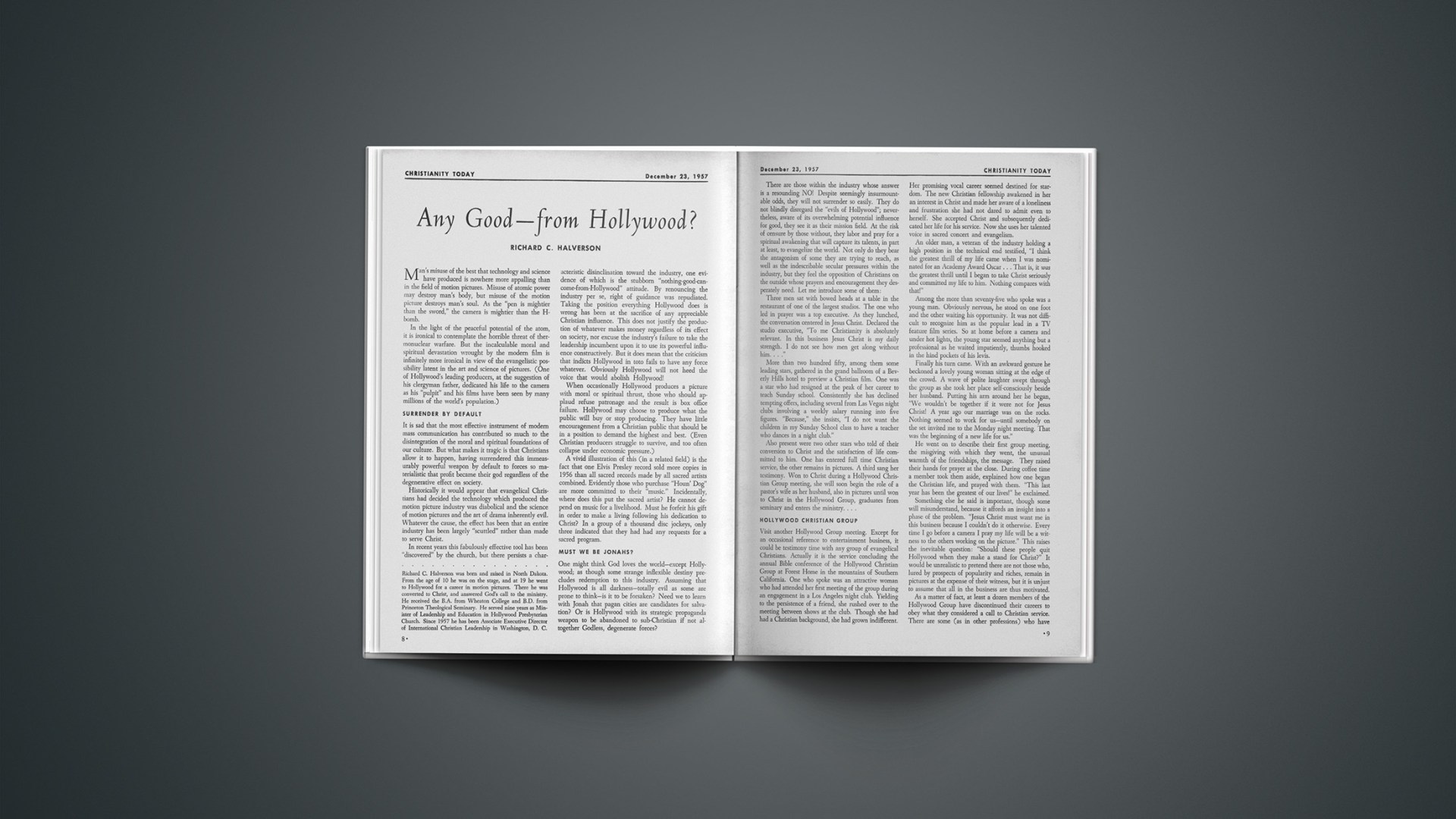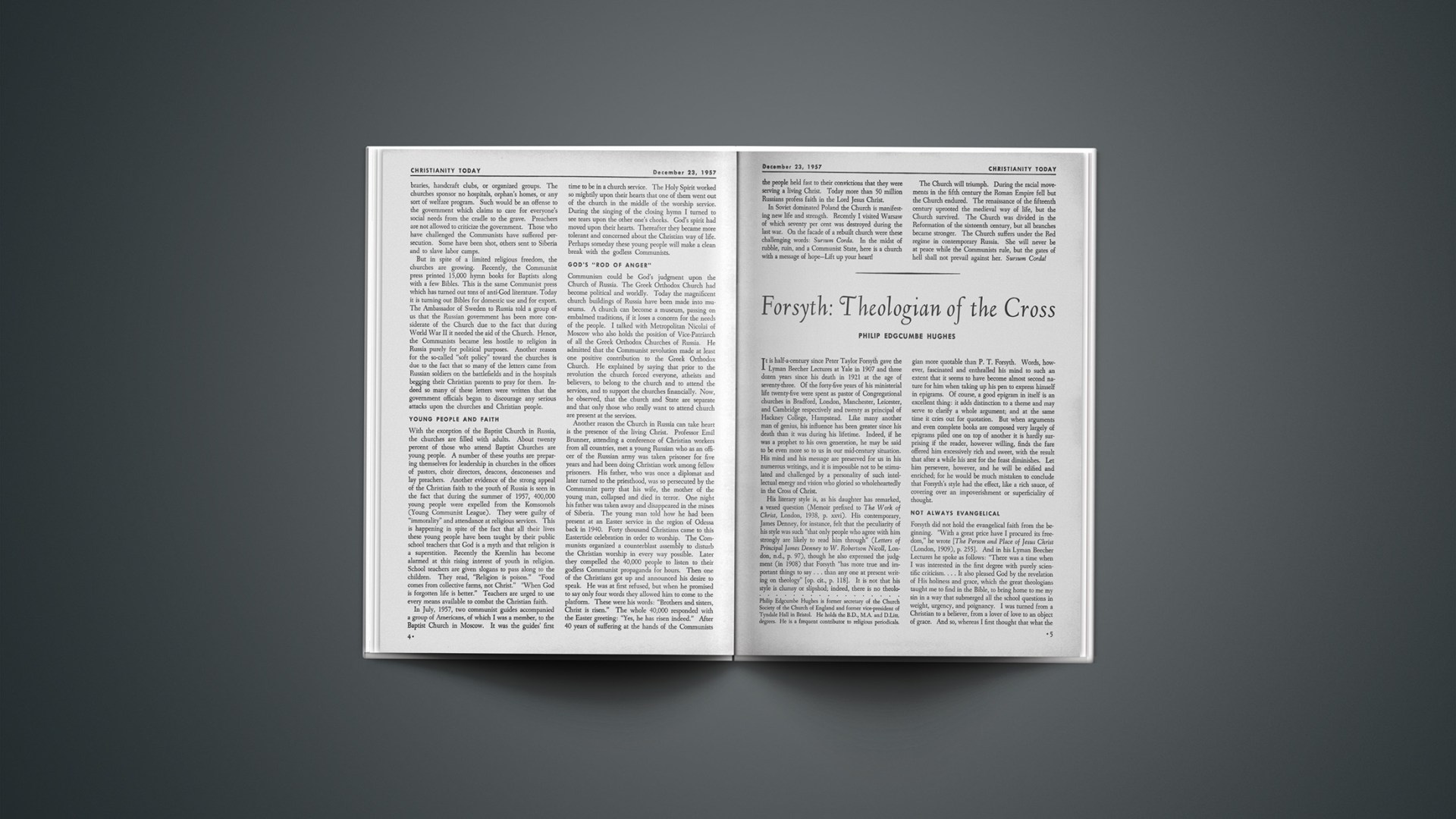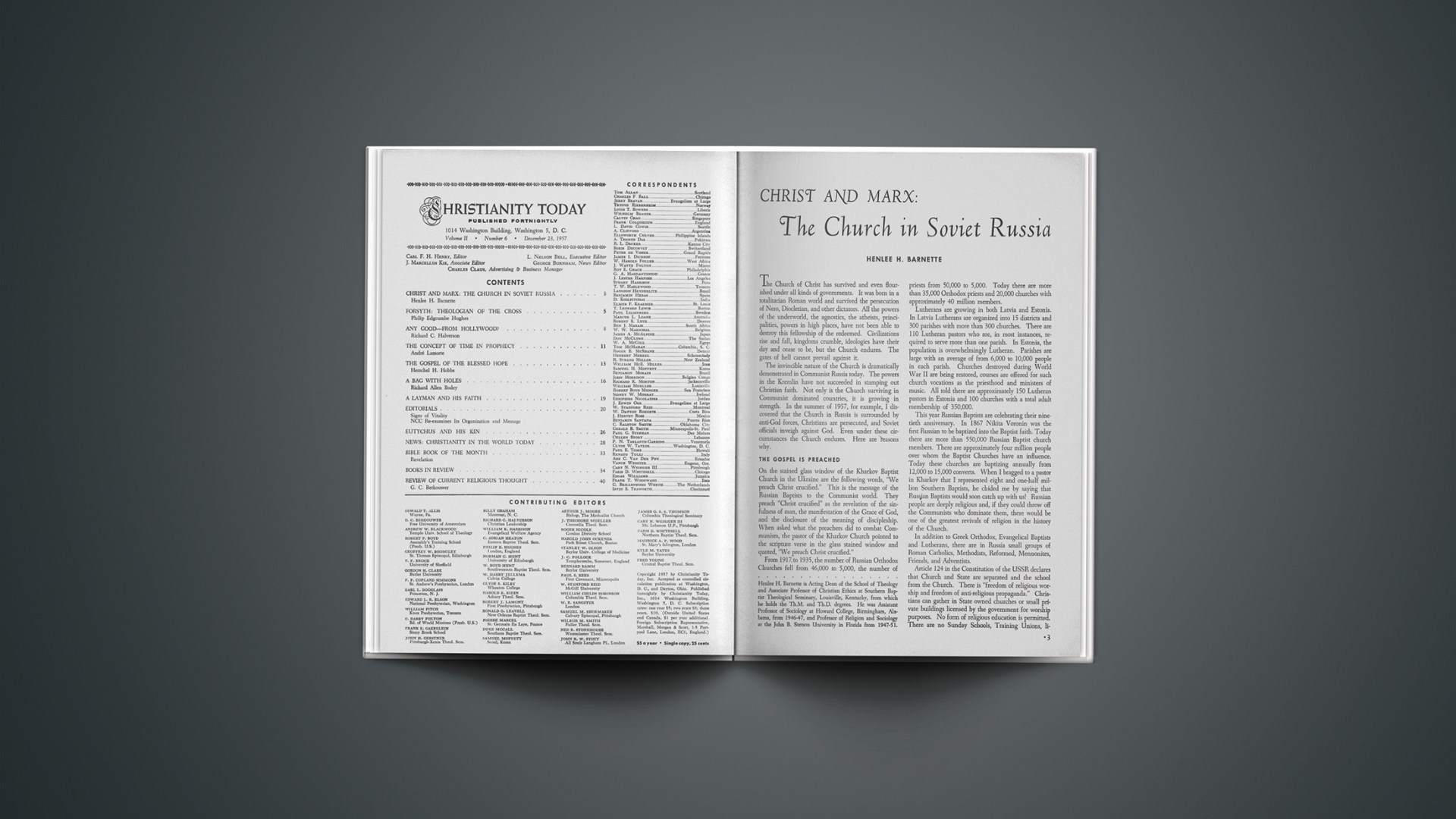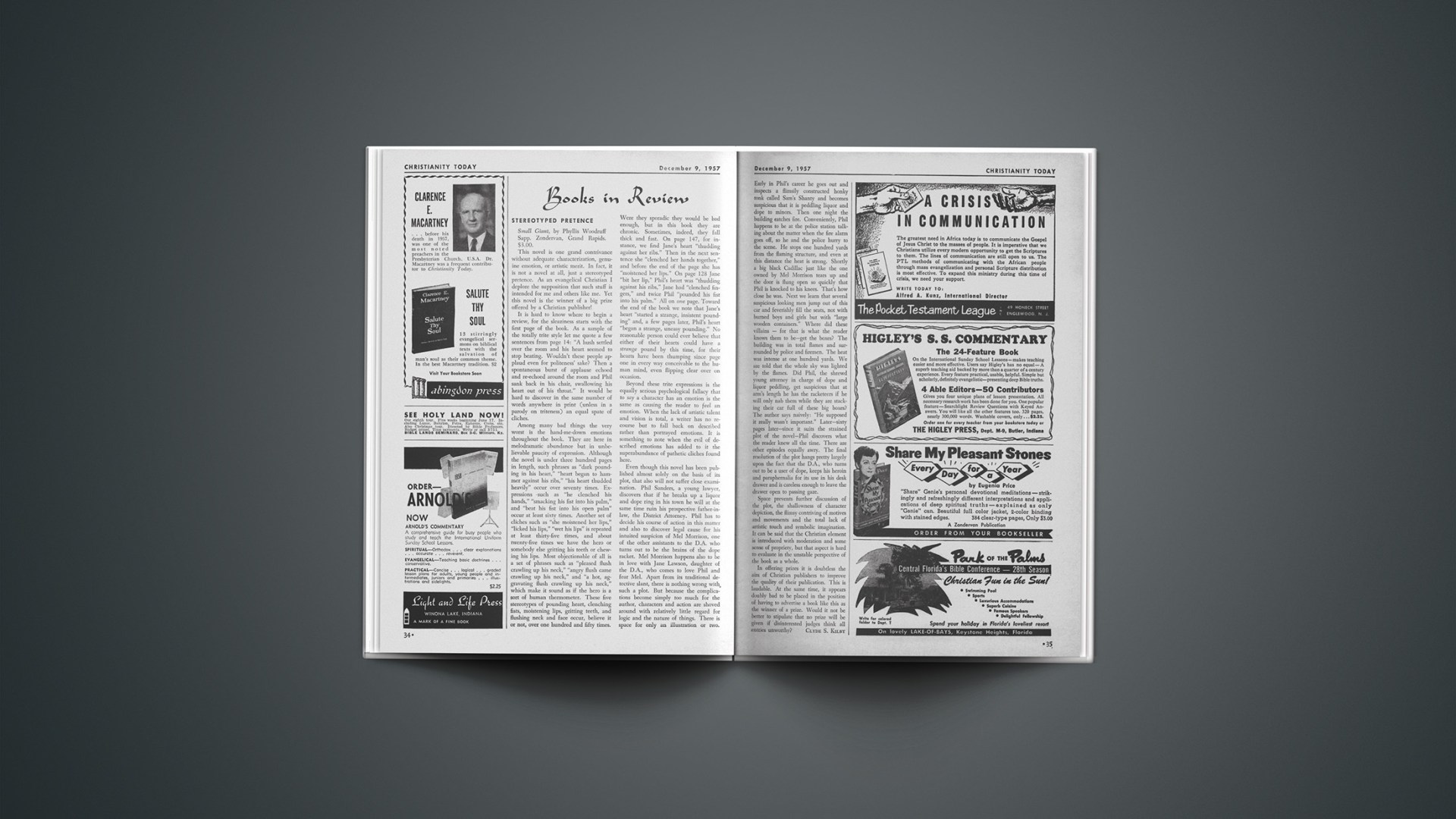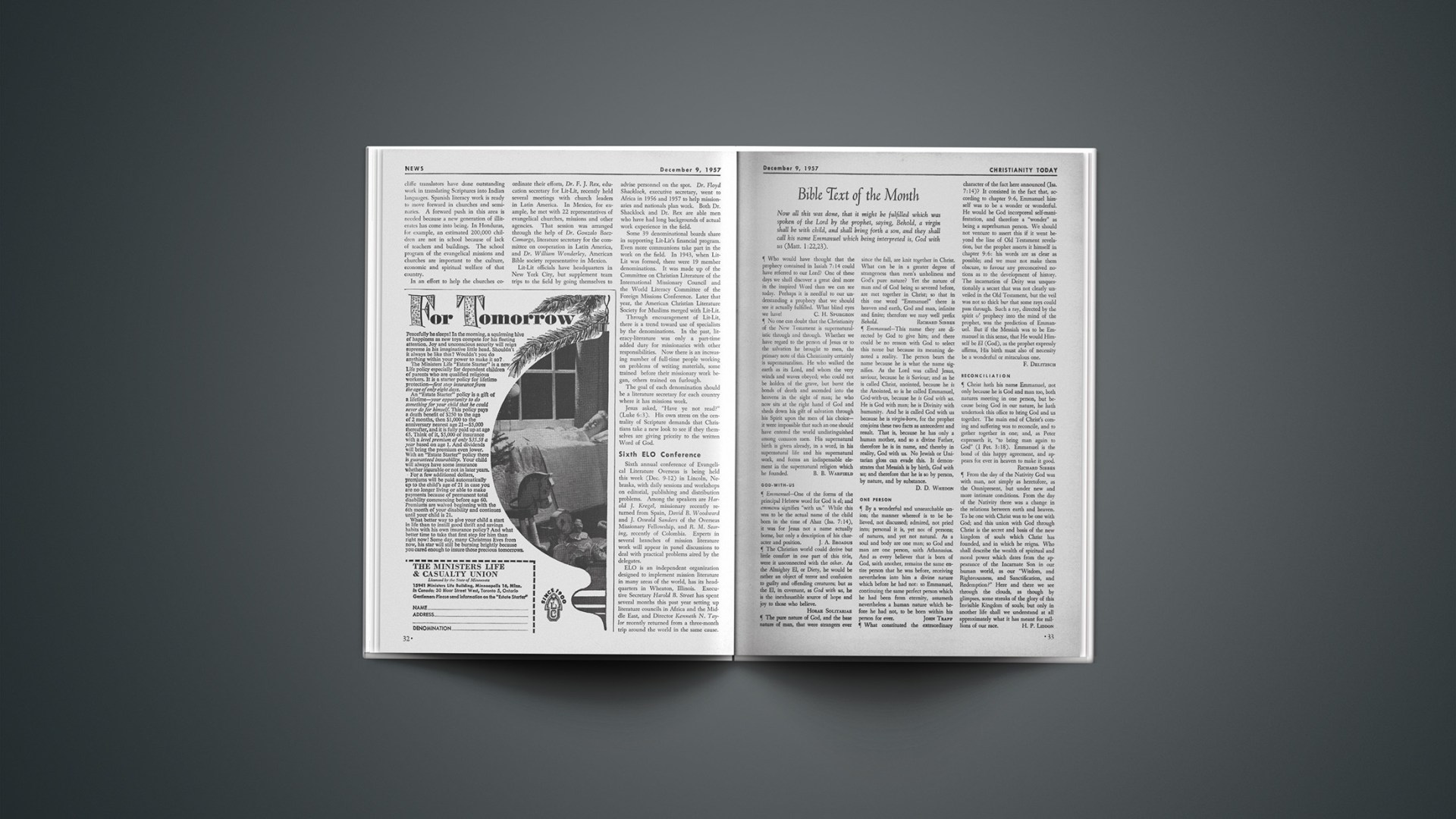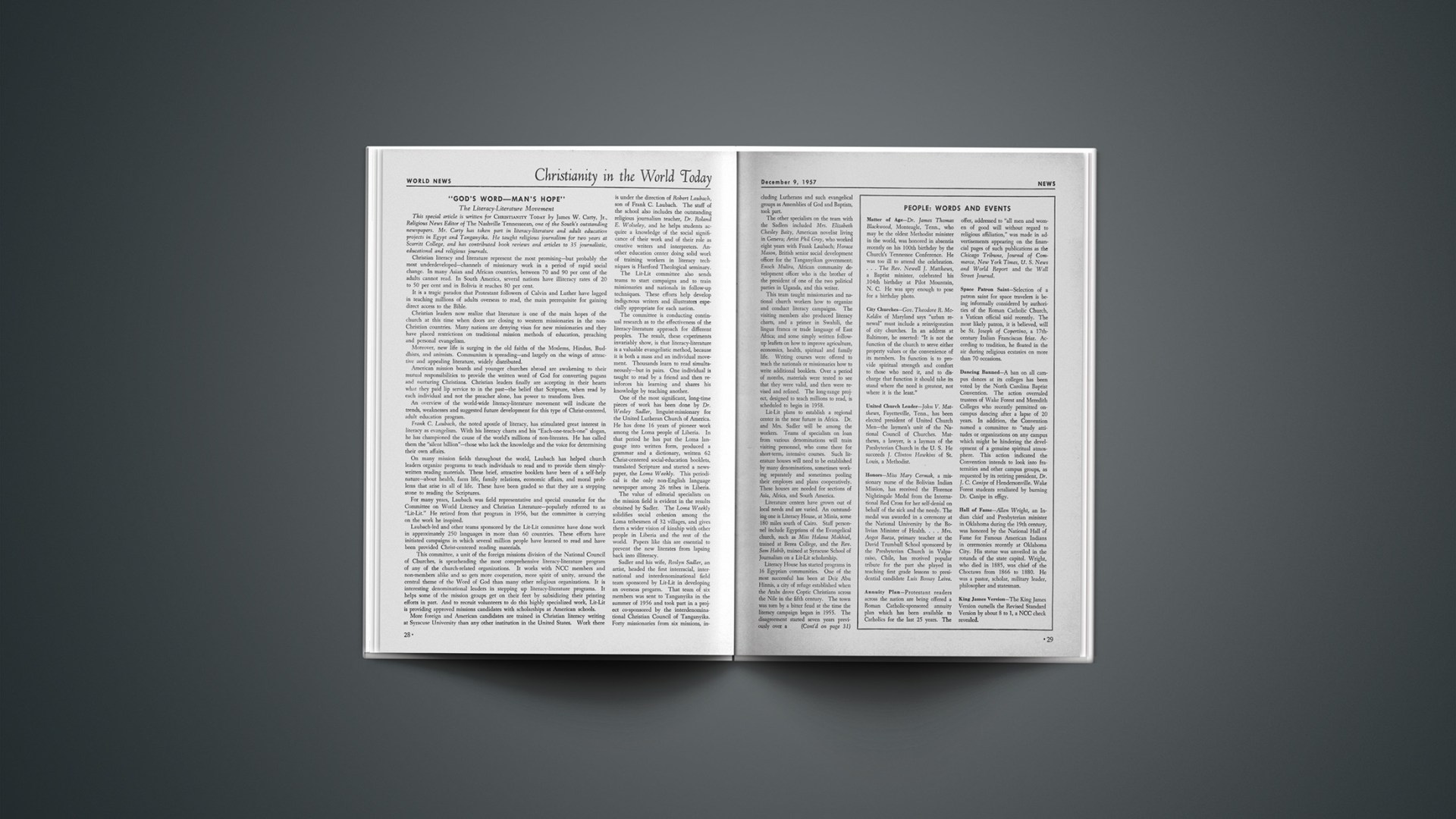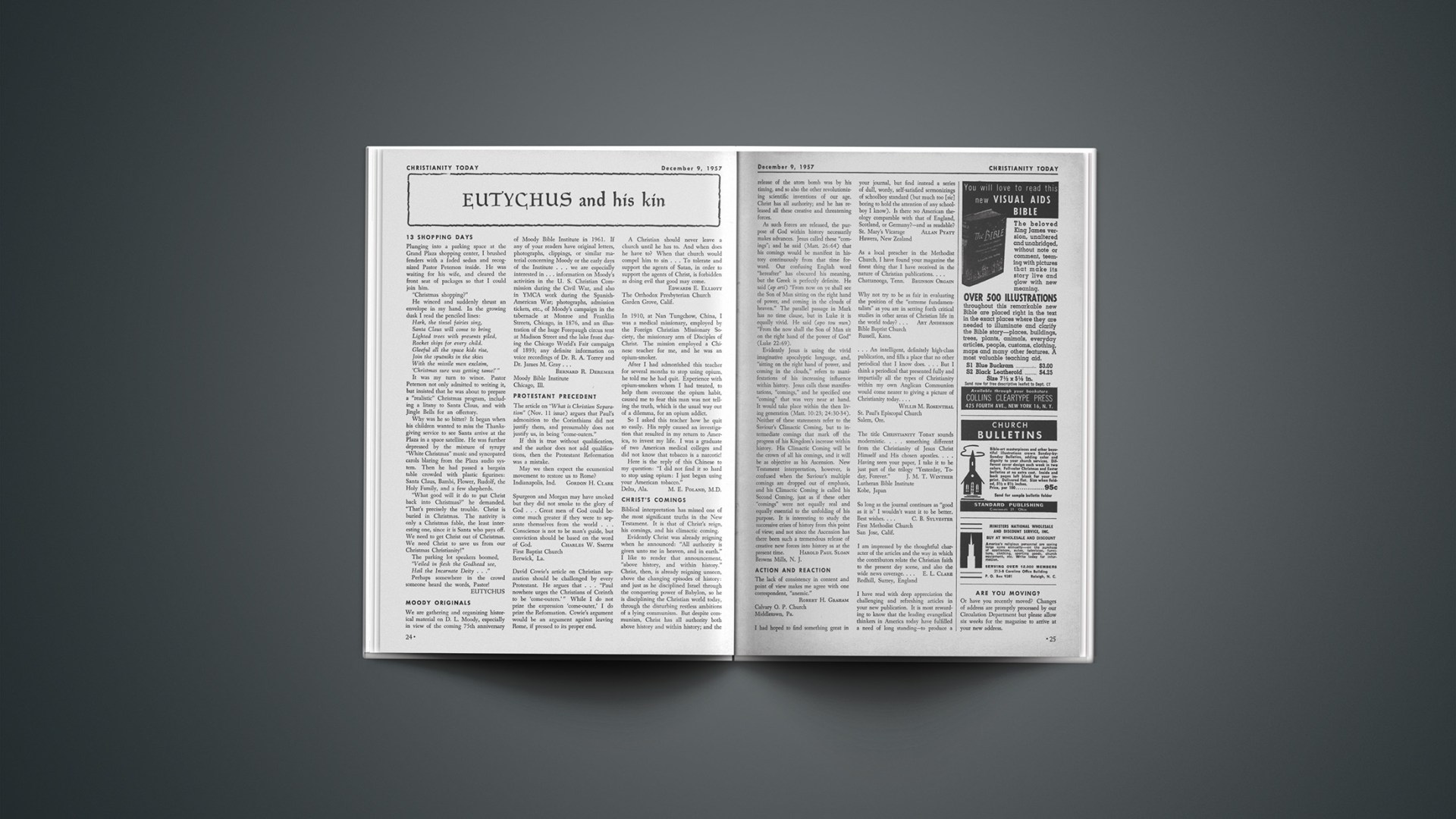Looking for that blessed hope, and the glorious appearing of the great God and our Saviour Jesus Christ—(Titus 2:13).
To the early Christians belief in the second coming of Christ was not a matter of speculation and controversy. Rather it was a gospel to be proclaimed as making meaningful the entire scope of the Christian message. The preaching and writings of the Old Testament prophets focused always upon the promised incarnation of God in Jesus Christ as the event in history which would give purpose to their utterances. So also the proclamations of the New Testament preachers and writers point ever to the second coming of Jesus Christ at the culmination of history as that “one far-off divine event, to which the whole creation moves.” There is no book or message in the New Testament which does not expressly declare or imply the return of our Lord as that “blessed hope” of those whose trust is fixed in him.
If this event was of such vital importance to the original heralds of salvation, not in the field of dialectics but as a message of assurance and hope, should not modern evangels rescue it from the realm of division to make of it the factor of unity that gives completeness to our gospel? To that end, therefore, let us consider “The Gospel of the Blessed Hope.”
The Second Coming And History
Preceding our text the Apostle Paul declared, “For the grace of God that bringeth salvation to all men, hath appeared [marginal reading], teaching us that … we should live soberly, righteously, and godly, in this present world; looking for that blessed hope.…” In this passage the apostle runs the entire gamut of history from eternity to eternity—past, present, and future.
“For the grace of God … hath appeared.” Here is the past, both immediate and remote. Stated in these words is the incarnation of God in Christ Jesus, the “Lamb slain from the foundation of the world” (Rev. 13:8), who “was made flesh, and dwelt among us … full of grace and truth” (John 1:14).
“Teaching us that … we should live soberly, righteously, and godly, in this present world.” These words point to the continuing present both for the writer and his readers in succeeding generations. While the gospel has a past in retrospect and a future in anticipation, it is ever present in its application. We are in error if we think of those people who were contemporary with Jesus and the apostles as living in a vacuum apart from the everyday pressures of life. They were men of like passions as we are, beset with the same temptations. They strived and failed, attempted and accomplished, even as we do. “Denying ungodliness and worldly lusts” as they sought to live “soberly, righteously, and godly” was to them a struggle no less than it is to us.
“Looking for that blessed hope”—before them beckoned the unfolding future, with its promise of victory and vindication. The dawn of a better tomorrow kept first-century men on their feet just as certainly as it does twentieth-century men. Is not this the part played by the “blessed hope” in the lives of Christian people of every age? Without it, how quickly the early Christians would have been overwhelmed in the maelstrom of persecution, hardships and tribulation! How would we go another step if suddenly that hope should dim?
That this is true may be seen even by a hurried examination of the teachings of Jesus. When John the Baptist came preaching that the kingdom of heaven was at hand, the entire land was awakened from centuries of lethargic sleep. The One for whom they and their fathers had been looking was soon to appear! Intermittently throughout Jesus’ earthly ministry this enthusiasm arose, but finally their hopes entered his grave with him. But when Jesus appeared alive, a foretaste of a more “glorious appearing,” their hope was resurrected also.
It was because Jesus knew what was in man that he constantly held up before them the promise of his return. To the dual fact of Jesus’ resurrection and promised reappearing at the end of the age, more than to any other, may we attribute this patient endurance. That they regarded his second coming as imminent is evidence of their faithfulness to his exhortation to watch and be ready (Matt. 24:44–51).
If we apply this same principle to every Christian generation even until now, and project it into the uncertain future, we shall see the tremendous place that the “blessed hope” occupies in the meaning of history. Apart from it life on this earth is truly what Shakespeare in Macbeth said that it is:
To-morrow, and to-morrow, and to-morrow,Creeps in this petty pace from day to day,To the last syllable of recorded time;And all our yesterdays have lighted foolsThe way to dusty death. Out, out, brief candle!Life’s but a walking shadow, a poor playerThat struts and frets his hour upon the stageAnd then is heard no more: it is a taleTold by an idiot, full of sound and fury,Signifying nothing.
But in the light of the “blessed hope” every segment of history, even of our lives, takes on infinite meaning. By it we can read the history of nations and civilizations with fresh understanding. In it we learn “the meaning of our tears.” The youth cut down in the early morning hours of life before he has had opportunity to try his wings of aspiration and desire! The aged, having run the gamut of life, yet with seemingly infinite potential unrealized! The defeat of truth amid the triumph of wrong! The yawning grave as it opens to receive all the earthly remains of those whom we have loved, and lost—for a while!
But at the very moment when our eyes are dimmed by the darkness of frustration, we hear the voice of Jesus, “Look up!” and see the “glorious appearing of the great God and our Saviour Jesus Christ.” And in that light we no longer see through a glass darkly or blurred, but face to face.
It is no wonder then that Paul on Mars Hill climaxed his philosophy of history with these words, “Because he hath appointed a day, in the which he will judge the world in righteousness by that man whom he hath ordained.…” (Acts 17:31). Those who knew the teachings of Jesus would readily recognize the implication of the “blessed hope.” It is as though the apostle had bound up the ingredients of history in one neat package. Beginning with the creation (Acts 17:24b–30), coming finally to that great day of the Lord when all wrongs would be righted, all sin punished, all righteousness rewarded, when there would be a “new heaven and a new earth, wherein dwelleth righteousness” (2 Pet. 3:13).
The Second Coming And Redemption
It is in the light of the “blessed hope” and its attendant event, the judgment, that we can best understand a further word of our text: “looking for … the glorious appearing of the great God and our Saviour Jesus Christ; who gave himself for us, that he might redeem us from all iniquity.…”
The Scriptures picture the “blessed hope” as one of terror for some (Rev. 6:15–17) and great joy for others (2 Tim. 4:8). The difference is to be found in the word redemption. Knowing this, “our great God and our Saviour Jesus Christ … gave himself for us, that he might redeem us.…”
But redemption itself has little or no meaning apart from the second coming of Christ. Certainly the death of Jesus would have been empty apart from his resurrection. To this truth the Scriptures testify abundantly. But if we remove the “blessed hope” we are still without God and without hope in this world. If we are redeemed for this life only, then we are of all men most miserable. Herein is the full meaning of our Lord’s words, “I go to prepare a place for you … I will come again, and receive you unto myself.…” (John 14:3). The Old Testament saints were saved by grace through faith, looking forward in the assurance that Christ would come. Likewise, New Testament saints are saved by grace through faith, looking not only backward to the fact that he came, but looking forward to the “blessed hope” when he will come again.
In the New Testament we find a word more comprehensive than redemption—salvation. Actually it is threefold in meaning: instantaneous, or redemption from the power of sin; continuing, or growth in grace and in the knowledge of our Lord Jesus Christ; ultimate, or our final glorification in heaven. It was to this last that the author of Hebrews referred when he said, “So Christ was once [once for all] offered to bear the sins of many; and unto them that look for him shall he appear the second time without [apart from] sin unto salvation” (9:28).
The first coming of our Lord was to the end that whosoever would believe in him should not perish but have everlasting life. Innately man was immortal, but in his lost condition immortality held for him only dread and despair. Immortality separated from God is spiritual death (Rom. 6:23; John 5:29f.). In his death, therefore, Jesus in our stead suffered the penalty for sin; in his resurrection he triumphed over sin and death to the end that he might redeem us from sin and become the earnest of our resurrection from the dead. But to what end?
Had the story ended there the disciples might well have looked longingly and despairingly into the clouds hovering over Olivet’s brow, knowing that they were left as orphans (John 14:18, literal translation) in the world. To be sure, Jesus’ promise, “I will come to you,” involved the coming of the Holy Spirit, but it included far more. This the disciples would remember as the angels said, “This same Jesus … shall come in like manner.…” (Acts 1:11). Down the road over which they must travel were persecution and death, but always beyond was the “blessed hope” of his glorious return, that where he was there would they be also. Their corruptible and mortal bodies would die, but awaiting them were those that are immortal and incorruptible. Soon in their ears would be heard the angry shouts of mobs that opposed their labors of love, but always in their hearts they heard from heaven the “shout” of the Lord, “with the voice of the archangel, and with the trump of God!” (1 Thess. 4:16). They might see their fellow-Christians fall by the sword, but with assurance that “the dead in Christ shall rise first: then we which are alive and remain shall be caught up together with them in the clouds, to meet the Lord in the air: and so shall we ever be with the Lord” (1 Thess. 4:16–17). And in these words they found comfort, strength, and a “blessed hope.”
The Old Testament prophet avidly but futilely sought to grasp this truth. “For since the beginning of the world men have not heard, nor perceived by the ear, neither hath the eye seen, O God, beside thee, what he hath prepared for him that waiteth for him” (Isa. 64:4; cf. 1 Cor. 2:9). “But God hath revealed them unto us by his Spirit.…” (1 Cor. 2:10). With the inspired seer on Patmos, therefore, we have an even more “blessed hope” as in anticipation we stand before the great white throne to see our names written in the Lamb’s book of life. Beyond that we behold a new heaven and a new earth wherein the tabernacle of God is with men, where there will be no more tears, pain, sorrow, or death. Where “there shall be no more curse: but the throne of God and of the Lamb shall be in it; and his servants shall serve him: and they shall see his face; and his name shall be in their foreheads. And there shall be no night there; and they need no candle, neither light of the sun; for the Lord God giveth them light: and they shall reign for ever and ever” (Rev. 22:3–5).
The Second Coming And Evangelism
Returning to our text we find that the apostle points out the historical purpose of our redemption in Christ, that he might “purify unto himself a peculiar people, zealous of good words.” Here we have the suggestion of evangelism, which also finds its ultimate meaning in the “blessed hope.”
As Jesus and his apostles climbed the Mount of Olives they inquired if at that time he would restore the kingdom to Israel. To which Jesus replied, “It is not for you to know the times or the seasons, which the Father hath put in his own power. But ye shall receive power, after that the Holy Ghost [Spirit] is come upon you: and ye shall be witnesses unto me both in Jerusalem, and in all Judaea, and in Samaria, and unto the uttermost part of the earth” (Acts 1:6–8). Immediately thereafter he ascended into heaven. As the disciples gazed heavenward two men in white apparel told them of his return, asking why they stood gazing after him. Implied in their words is insistence that they be about the Lord’s business which he had a moment before committed to their care, the task of evangelism.
Thus we discover a twofold relation between evangelism and the “blessed hope.” In the first place, they had a message to declare, for the gospel of the kingdom must “be preached in all the world for a witness unto all nations; and then shall the end come” (Matt. 24:14). In this there is a twofold urgency: all nations must hear the gospel before he comes; and he cannot come until they do. In the meanwhile he waits “expecting till his enemies be made his footstool” (Heb. 10:13).
Still again, as stewards of the gospel the followers of Christ must give an account of their stewardship at his coming. It is no simple thing to have this treasure in earthen vessels! The knowledge of what awaits lost men in the judgment should weigh heavily upon our hearts. Paul realized this when he said, “Knowing therefore the terror of the Lord, we persuade men.…” (2 Cor. 5:11). The Bible tells us that if we fail to do so, and they perish, then their blood is on our hands.
Harking back to our text we find a dual emphasis in evangelism, both of which are related to the “blessed hope.” In the first place, Christ is purifying unto himself a peculiar people. This end is accomplished not only in redemption but in progressive sanctification of his followers that they might become fit instruments in his service. The incentive for this is not only our changed natures, love for Christ and passion for lost souls. It is further found in the knowledge of our Lord’s return. To this end Peter, after declaring the fact of the Lord’s certain return, exhorts, “Seeing then that all these things shall be dissolved, what manner of persons ought ye to be in all holy conversation [manner of life] and goodness” (2 Pet. 3:11). He concludes with the practical advice, “Wherefore [in view of the Lord’s return], beloved, seeing that ye look for such things, be diligent that ye may be found of him in peace, without spot, and blameless” (Verse 14).
As belief in the imminent return of our Lord is conducive to holy living, the loss of that conviction produces the opposite effect. This may be seen today as it was in the first century. In this light we understand Peter’s warning: “I stir up your minds by way of remembrance … knowing this first, that there shall come in the last days scoffers, walking after their own lusts, and saying, Where is the promise of his coming?” (2 Pet. 3:1, 3–4). Quite naturally such conduct negates one’s Christian influence, making it impossible for one to fulfill his stewardship of the gospel.
In the second place, a purified people must be “zealous of good works.” Many good people are good for nothing. Thus in the Christian’s life there must be not only a negative attitude by which he abstains from evil practices. In addition there must be the positive element of zeal with regard to good works. That this latter attitude involves a proper regard to the “blessed hope” may be seen in the many warnings of Jesus. This is the sense of his warning regarding constant readiness (Matt. 24:44). He is the “faithful and wise servant” who uses his peculiar position “go give them meat in due season,” or to share with other the life which has been placed in his charge. On the other hand, he is an “evil servant” who says in his heart, “My lord delayeth his coming,” and “shall begin to smite his fellow-servants, and to eat and drink with the drunken,” or to use his peculiar privilege for personal pleasures.
In the same vein do we understand the parable of the talents (Matt. 25:14–30). To “his own servants” the Lord has entrusted “his goods” during his absence. Two servants proved to be good stewards, while a third, honest but indolent, became a “wicked and slothful servant.” “After a long time (author’s italics) the lord of those servants cometh, and reckoneth with them” (Verse 19). The details of this reckoning are too well known to require delineation. Had there been a daily expectancy on the part of the one servant certainly his attitude with respect to his stewardship would have been different.
Do we need to apply this evident truth? Daily conduct in personal righteousness and faithful stewardship of the gospel will be in direct proportion to one’s attitude toward the personal return of the Lord. What we are and what we do today will be determined largely by the degree of expectancy we have as to the imminence of the “blessed hope.” If properly regarded the day-to-day matters of our lives will take on a different degree of importance. Proper perspective will give precedence to personal righteousness and positive witnessing over the social and economic pursuits which absorb our energies and passions.
Of surpassing importance, therefore, are the words of Jesus, “Watch therefore, for ye know neither the day nor the hour wherein the Son of man cometh” (Matt. 25:13, author’s italics).
We see, therefore, the vital place that the gospel of the “blessed hope” occupies in every phase of life. It gives meaning to the broad scope of history, to our personal redemption, and to the practical element of evangelism. To this end let us exalt it not as a subject of debate and speculation, but as the incentive and end of holy and effective living.
Herschel H. Hobbs is a native of Alabama. Howard College, where he received the A.B. degree in 1932, conferred on him an honorary D.D. degree in 1941. He also holds the Th.M. and Ph.D. degrees from Southern Baptist Theological Seminary. Pastor of First Baptist Church, Oklahoma City, he is an active leader in the Southern Baptist Convention.

